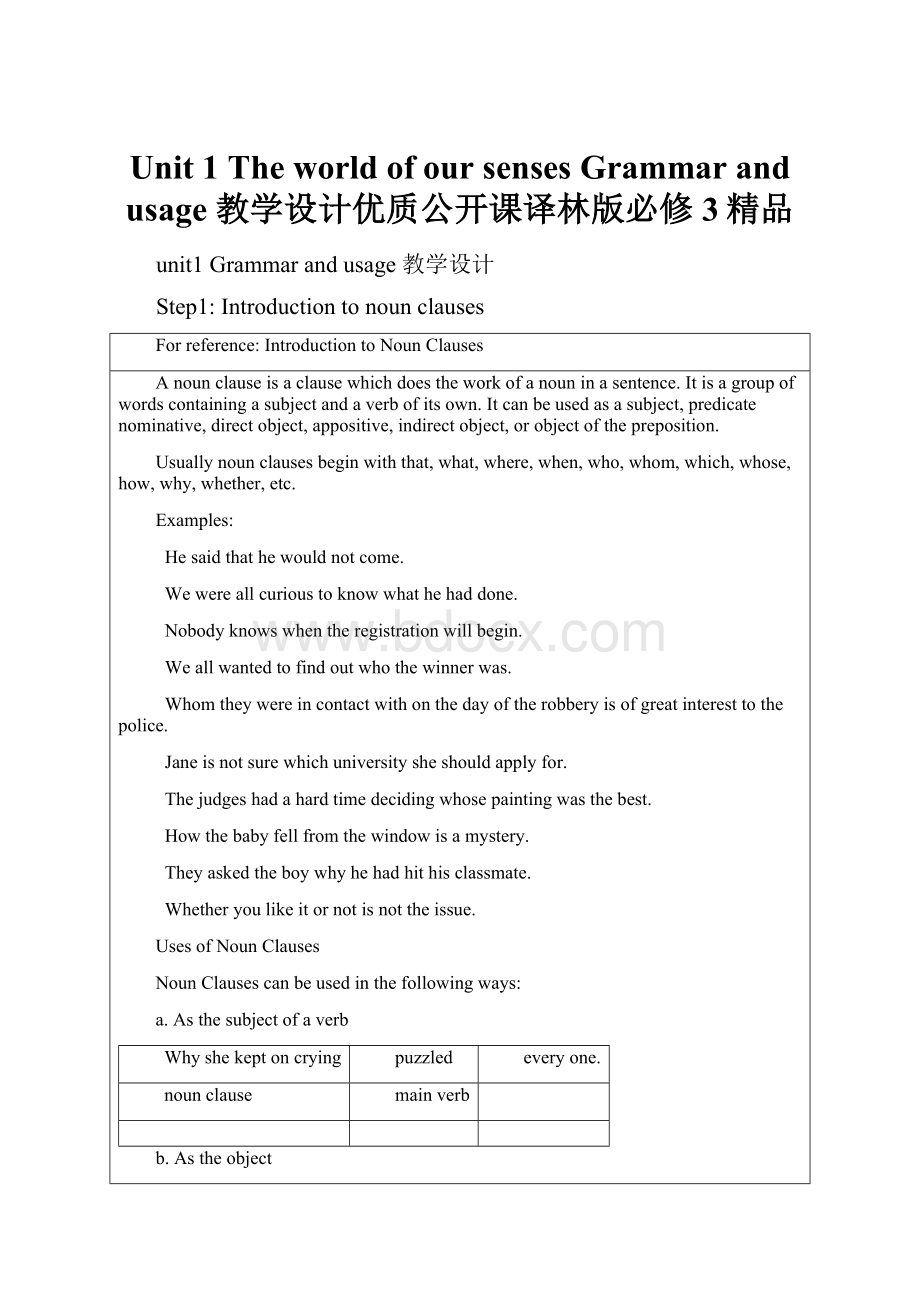Unit 1 The world of our senses Grammar and usage 教学设计优质公开课译林版必修3精品.docx
《Unit 1 The world of our senses Grammar and usage 教学设计优质公开课译林版必修3精品.docx》由会员分享,可在线阅读,更多相关《Unit 1 The world of our senses Grammar and usage 教学设计优质公开课译林版必修3精品.docx(12页珍藏版)》请在冰豆网上搜索。

Unit1TheworldofoursensesGrammarandusage教学设计优质公开课译林版必修3精品
unit1Grammarandusage教学设计
Step1:
Introductiontonounclauses
Forreference:
IntroductiontoNounClauses
Anounclauseisaclausewhichdoestheworkofanouninasentence.Itisagroupofwordscontainingasubjectandaverbofitsown.Itcanbeusedasasubject,predicatenominative,directobject,appositive,indirectobject,orobjectofthepreposition.
Usuallynounclausesbeginwiththat,what,where,when,who,whom,which,whose,how,why,whether,etc.
Examples:
Hesaidthathewouldnotcome.
Wewereallcurioustoknowwhathehaddone.
Nobodyknowswhentheregistrationwillbegin.
Weallwantedtofindoutwhothewinnerwas.
Whomtheywereincontactwithonthedayoftherobberyisofgreatinteresttothepolice.
Janeisnotsurewhichuniversitysheshouldapplyfor.
Thejudgeshadahardtimedecidingwhosepaintingwasthebest.
Howthebabyfellfromthewindowisamystery.
Theyaskedtheboywhyhehadhithisclassmate.
Whetheryoulikeitornotisnottheissue.
UsesofNounClauses
NounClausescanbeusedinthefollowingways:
a.Asthesubjectofaverb
Whyshekeptoncrying
puzzled
everyone.
nounclause
mainverb
b.Astheobject
Nobody
knows
howhegotinvolvedinganglandactivities
verb
nounclause
c.Asthecomplementoftheverb"tobe"orpredicative
Whatweareworriedaboutisthathemayhaveanotherheartattack.
Thequestioniswhytheycouldescapethroughthefrontdoorwhenthereweresomanyguardsthere.
ANotetoStudents:
Therearesomecommonerrorsamongmanystudentswhentheyusenounclausesinsentences.Herearesomeoftheerrors:
1.Inversionstructurewithinthenounclause
:
Whereistheplaceisstillnotclear.
Intheaboveexample,theinversionstructureisusedinwhichthesubject(theplace)isprecededbyaverb(is).Mistakeslikethisreflectthetendencyofstudentstomistakeinterrogativewordslikewhere,when,why,how,etc.whenusedinnounclausesforthoseusedinquestions,asin"Whereisthewallet?
”
Itshouldthereforebenotedthatthestructuralcomponentsofanounclausearetheorderofastatementor"Subject+Verb"asin:
Whatyoudoisterrible.
Whateveryousaywillinterestusall.
However,thereisanexceptiontotherule.Oneshouldnotethatanounclausethatbeginswithwhatcanalsobeimmediatelyfollowedbyafiniteverb,withouthavingasubject,asinthefollowing:
:
Whathasbeendiscussedinthemeetingwillremainasecret.
:
Heaskedmewhatthematterwithmewas.
2.Nomainverbinthesentence
Sincenounclausesveryoftenservetoemphasizeaparticularideainasentence,manystudentstendtothinkthattheirfunctionistoemphasizeonlyandthattherearenostrictrulestofollowwhenusingthem.Thisisamisconception.Lookatthefollowingsentence:
:
Whattheylikeluxurygoods.
Intheabovesentence,thestudentmayhavethoughtthat"like"mayfunctionasthemainverbofthesentence.Since"Theylikeluxurygoods"areacompletesentence,andthat"what"isonlyanemphasizer,sothestudentmaythinkthatthesentenceiscorrect.Inthiscase,thestudenthasforgottenthatthestructuralcomponentsofanounclauseare"Subject+Verb"(asin"Whattheysay"),andmistakentheverb"like"withinthenounclauseasthemainverbofthewholesentence,therebyproducingasentencethatdoesnothaveamainverb.
Itshouldbenotedthatalltheseinterrogativeslikewhy,who,when,how,whether...etc.,althoughtheyserveasemphasizers,beginaclausewhosestructuralcomponentsaresubjectandverb.Thismeansthattheverbinsidetheclause,inthiscasetheverb"like",cannotfunctionasthemainverbofasentence.Inthefollowingsentence,"is"isthemainverbofthesentenceand"like"isthefiniteverbwithinthenounclause.
:
Whattheylikeisluxurygoods.
3.Mistakingwhere,when,why,how,etc.fortherelativepronoun"which".
:
Iliveinabuildingwhichhas40storeys.
:
Iliveinabuildingwherehas40storeys.
Ifyoureallywanttouse"where"insteadof"which"intheabovesentence,followthestructuralruleofnounclause:
"Subject+verb":
:
Iliveinabuildingwherethereare40storeys.
Somestudentssee"which"and"where"asequivalentwhentheyareusedasrelativepronouns.Yet,"which"and"where"bearsimilarmeaningandrequiredifferentstructuralcomponentswhentheyareusedasrelativepronouns.
1.Lookatsomeexamples:
1)Atlunchtime,theradioweathermanreportedthatthemistwouldbecomeathickfogintheafternoon.
2)Shewonderedifthebuseswouldstillberunning.
3)Thetruthisthatthefogistoothickforthebustorunthatfar.
4)Whatsurprisedmemostwasthattheoldmancouldn’tseeanything.
Asyoucansee,thefunctionoftheseunderlinedsentencesarethesameasnounsornounphrasessotheyarecallednounclauses.Read1-5onpage8tolearnmoreaboutnounclauses.
2.FromPart1onpage8,youmayfindthatanounclausecanbeusedasthesubjectofasentence.Andwecallitthesubjectclause.Thewordsusedtointroducenounclausesarecalledconjunctions.Theconjunctionsarethat,whetherandwhy,etc.
Payattentiontothesentenceinwhichitisusedasanemptysubject.Sometimesitisputatthebeginningofasentenceandusedastheformalsubjectwhilethenounclauseisputattheend,becauseinEnglishpeopleusuallyputlongorcomplicateditemstowardstheendofasentence.Therefore,itcanalsobecalleda'preparatorysubject'.
(A)Itisclear/certain/likely/true/surprisingthat…
(B)Itisapity/shame/goodidea/nowonderthat…
(C)Itissaid/reported/believed/known/thought/suggestedthat…
(D)Itseems/happensthat…
e.g.:
IthappenedthatIwentoutlastnight.
ItissaidthatChinawillwinintheWorldCup.
3.InPart2,wecanseethatanounclausecanbeusedastheobjectofaverboraprepositioninasentence.Andwecallittheobjectclause.Theconjunctionsusedtointroducetheobjectclausesintheexamplesentencesarethat,if/whether,which,who,etc.
Readthetwosentencesinwhichitisusedasanemptyobject.Whenanobjectclausetogetherwithanadjectiveasanobjectcomplementisusedafterthepredicateverb,wecanuseitasanemptyobjectaftertheverbandputtheobjectclauseaftertheobjectcomplementtoavoidhavingalongerandheavierhead.Also,theclausecominglastinasentenceusuallyhasthehighest'informativevalue'inanycase.
4.WeknowfromPart3thatanounclausecanbeusedasthepredicativeafterthelinkverbbe.Andwecallitthepredicativeclause.Theconjunctionsusedtointroducethepredicativeclausesarethat,whetherandhow.
5.Lookatthefollowingexamplesontheblackboard.Payattentiontotheredpartineachsentence.
Polly,atwenty-year-oldyounglady,wasledhomebyanoldblindmaninaheavyoffog.
ThebookAbriefHistoryofTimewaswrittenbyStephenHawking,agreatscientist.
ThefactthatPollyhasn’taskedfortheman’snameispity.
Theredpartsinthethreesentencesareinapposition.Thatistosay,anoun,anounphraseoranounclauseisplacedequivalentlywithanothernounasanexplanatorypart,bothhavingthesamesyntacticrelationtotheotherelementsinthesentence.Whenanounclauseisusedinoppositiontoanoun,itiscalledtheappositiveclause.Theconjunctionusedtointroducetheappositiveclauseinthelastsentenceisthat.
FromtheexamplesinPart4,wecanseethatthenounwithanappositiveclauseisusuallyanabstractnoun,suchasnews,fact,idea,truthortheory.Anappositiveclausecanstrengthentheabstractnounwithsomedefiniteinformation.
6.Fromtheexamplesofthefiveparts,weknowwhatwordscanbeusedasconjunctionstointroducenounclauses.Putdownthewordsonyournotesbookforlaterretrieval.
conjunctionstointroducenounclauses
conjunctions:
that/whether/if
conjunctivepronouns:
what/who/which/whose/whatever/whoever/whomever/whichever
conjunctiveadverbs:
where/when/why/how/wherever/whenever
7.Readthearticleonpage9toidentifyallthenounclauses,whicharethesubject,object,predicative,orappositiveclausesandpointouttheconjunctionineachclause.Andthendescribethemainideainyourownwords.
Answers(Page9)
Paragraph1
Thepossibilitythatpleasantsmellsmightreducepainhasrecentlybeensuggestedbynewresearch.(anappositiveclausewiththatusedastheconjunction.)
Paragraph2
Aspeoplebelievethatstrongsmellscanaffectthesenses,(anobjectclausewiththatusedastheconjunction.)
Paragraph3
Scientistsareinterestedinwhetherthesenseofsmellisrelatedtopainandwhethermenandwomenhavethesamesenses.(objectclauseswithwhetherusedastheconjunction.)
Now,thestudyhasprovedthatforwomen,pleasantsmellsreducepain.(anobjectclausewiththatusedastheconjunction.)
Paragraph4
Hesaysthatscientistsalreadyhavedatafrom40volunteers.(anobjectclausewiththatusedastheconjunction.)
Headdsthatthisyear,scientistswilltestanother60volunteersandwillbeinabetterpositiontoexplaintheresults.(anobjectclausewiththatusedastheconjunction.)
Paragraph5
Oneexplanationisthatwomen’ssenseofsmelldevelopedlongago,andislinkedtorecognizingthesmellofbabies.(apredicativeclausewiththatusedastheconjunction.)
Scientistsusedtobelievethatmothersrecognizedtheirchildrenbysightonly.(anobjectclausewiththatusedastheconjunction.)
Nowtheyhavestartedtobelievethatthesenseofsmellalsohelps,butwhypleasantsmellsdonotreducepai